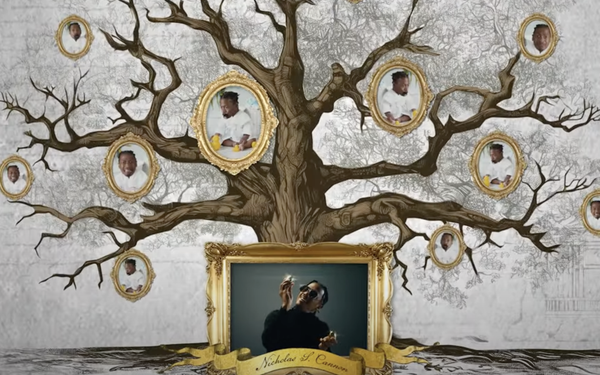
Only a tiny
percentage of men -- perhaps fewer than 1% -- think their balls could benefit from odor management. Dr. Squatch believes it’s just the brand to change that. So it is teaming up with comedian
Nick Cannon, proud father of 12 kids. In partnership with Dr. Squatch, Cannon is taking out a $10 million insurance policy on his balls to help hype the brand’s new Ball Care line.
Although it can’t get the ads on TV, John Ludeke, Dr. Squatch’s vice president of marketing, says there’s plenty of
other ways to spread the word.
CPG Insider: Why ball care, and why now?
John Ludeke: We've landed on private hygiene as an excellent opportunity for us to deliver on our
mission, inspiring men to be happier and healthier.
advertisement
advertisement
CPG Insider: And why the Nick Cannon stunt?
Ludeke: We always try to find entertaining ways to grab male
attention and educate them. In what we believe is a first, guys can go to our website, answer a few questions and find out exactly what their family jewels are worth. We enlisted Nick, who represents
our values and brings them to life. He's a fit, healthy guy who takes great care of himself and is well-known for not taking himself too seriously. He's a great fit.
CPG Insider: The
“whole body deodorant” category, pioneered by niche D2C brands like Lume, is growing fast, thanks to Procter & Gamble and Unilever. Why are American consumers suddenly talking about
all-over body odor?
Ludeke: It's so interesting. There have been two movements. One is about men being more open to grooming for their bodies and nether regions. Several different
brands have helped with that. Second, there’s this growing awareness of the whole body. Lume and some other brands have done a great job building that space. Most of the sales in the category
are coming from women. We’re trying to build on both trends. This launch includes our Groin Guardian Trimmer, for example, and we’ve got Beast Wipes, targeting balls, butt and body, and a
Ball Barrier lotion.
CPG Insider: How do you differentiate those from products already out there?
Ludeke: Right now, there's no great natural alternative with the scents
and fragrances we're well known for. From a whole-body odor standpoint, it’s still a small category with low household penetration.
CPG Insider: How low?
Ludeke:
Tiny. Less than 1% of the deodorant business. We aim to focus on how this additional offering gives men different usage occasions with a great-smelling natural product. That’s always our
focus.
CPG Insider: What type of men are open to this? It’s a pretty big change to their grooming routine.
Ludeke: Younger millennial and Gen Z men.
CPG
Insider: What’s the media plan like?
Ludeke: Unfortunately, we could not get approval to run the ads on TV. This will be primarily a social launch, and you'll see the ads on
TikTok, Meta platforms and YouTube.
CPG Insider: Why couldn’t you be on TV? Other brands are on air, discussing using deodorant on your privates.
Ludeke: I was
really surprised, especially when you look at what's covered on news channels. Turns out the word “balls” is radioactive.
CPG Insider: No balls at all?
Ludeke: No. We assumed there would be some pushback on the spots, but it was just a no-go. After learning that, we chatted with some women's brands that had similar problems. That's made us
more interested in these products. All of this is taboo from a personal care standpoint, yet we're bombarded with even more aggressive messaging all the time. We’re trying to do something funny,
but the goal is to get guys talking about their bodies in a productive, healthy way. Cleanliness, hygiene and grooming are important from a health standpoint, but they also help people feel more
confident.
CPG Insider: How does a campaign like this fit your overall marketing approach?
Ludeke: We do "always on" campaigns that we consider evergreen. People get
desensitized to that material and it just becomes wallpaper. So, we'll hit throughout the year with launches like this. That standard 15-second social media ad is something every CPG brand does, so it
becomes a game of "How much money do you have?" While we keep those baseline ads running, we also want to be a brand that people find funny and emotionally engaging. The only way to do that is with
something unique and unusual.
CPG Insider: Will you be back on the Super Bowl this year?
Ludeke: We’re not sure.
CPG Insider: There have been reports
that Dr. Squatch is now valued at over $2 billion. What are your annual sales?
Ludeke: I can't reveal revenue or how much we're spending on media. But I can say Dr. Squatch is growing
extremely well and continues to accelerate. We’ve found a wonderful opportunity by expanding into retail.

CPG Insider: Can you say more about your shift away
from D2C?
Ludeke: The economics changed a lot with the iOS 13 updates. It costs so much to acquire new customers that the math doesn't work anymore. Historically, most personal care
sales come from brick-and-mortar, Amazon or other ecommerce sites, not branded websites. During COVID, people were willing to buy online, but that's shifted back.
CPG Insider:
That’s a challenge, though. Because at Walmart, you’re not a funny brand. You’re just another product on the shelf.
Ludeke: Our focus has been working closely with
retail partners, including Walmart, Target, Kroger, Albertsons and Safeway, to think about the space differently and help them create a “better for you” category in stores. We are
competing against other natural brands, but we’re a lot bigger than them now. And we’re seeing a lot of volume from people coming from conventional products, looking for something better.
It’s not a luxury consumer, but someone who understands that quality and naturalness are important. Being on the shelf next to everybody else is not enough -- for us, that's a losing
strategy.
CPG Insider: How do you avoid that?
Ludeke: Fun and exciting limited programs that add entertainment, like our partnerships with Disney and Universal. We do
lots of seasonal scents.